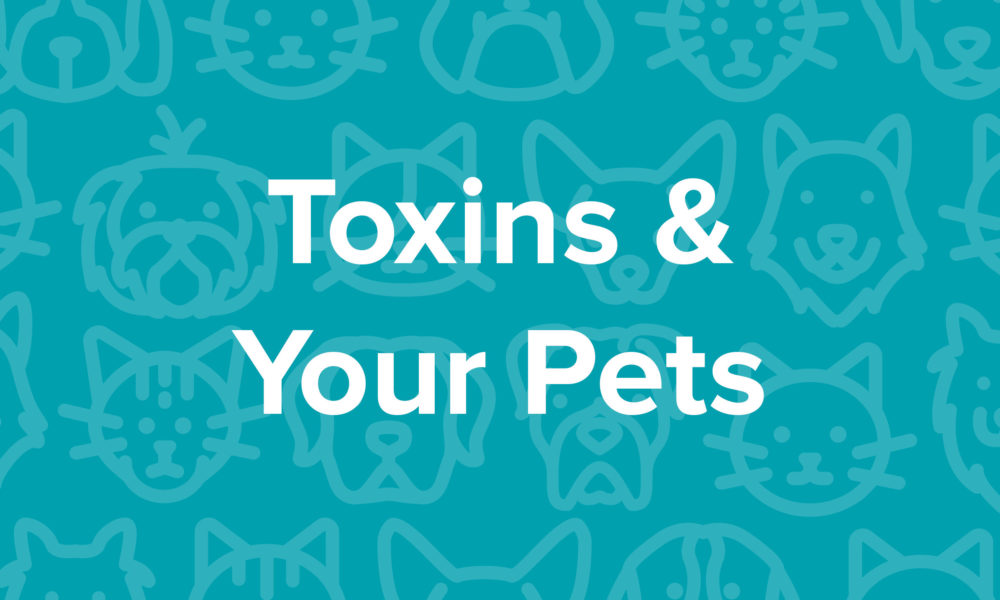Substances that are Toxic for your Pets

With summer approaching and people and their pets spending more time outdoors, we thought you might like to know about some everyday things you may not realize are harmful to your pets.
Indoor Hazards
Foods: There are many foods that humans love that are not good for your furry family members. Some of the most common ones are chocolate, coffee, tea, avocado, grapes and raisins, onions, garlic, and anything containing the artificial sweetener, xylitol. Xylitol is used in sugar-free products like candy, chewing gum, and peanut butter – and we know most dogs love peanut butter, so check the label before giving it to your dog! You should also keep the garbage out of your pets’ reach since old or rotting foods can contain mold or bacteria that can cause food poisoning, which is probably why you threw it out in the first place!
Cleaning Products: You might not think that pets would be interested in cleaning products – after all the only cleaning they do is their own fur! However, the smell of some products is attractive to pets. Cleaning products that contain bleach can cause drooling, vomiting, and diarrhea, or burns to the throat if swallowed. Always follow the instructions on the label about use around pets and store products in a secure cabinet, preferably out of reach of your pets. We know how curious they can be!
Medications: All your medications (your pets’ too!) should be stored out of reach. Many medications that people commonly have in their homes are particularly risky for pets. These include ibuprofen (Advil), acetaminophen (Tylenol), cold medications, antihistamines, diet pills, and antidepressants. If your pet takes any prescribed medications, keep those out of reach too. Even if a medication is prescribed for your pet, it can be dangerous if they get into it on their own.
Insecticides: Any product used to kill insects in the house should be stored and used in an area that is inaccessible to your pets. These products are designed to be fatal for insects but can be fatal for your pets too. Follow all label instructions. This includes flea and tick treatments. For example, never use a product made for dogs on your cat, and always consult your veterinarian for any questions.
Indoor/Outdoor Hazards
Some products that are hazardous are found indoors and/or outdoors and may be stored in a garage or shed. Be sure you don’t leave your pets alone in an area where these are stored. You may think that your pets won’t go near these products, but sometimes the smell or texture can attract them, and they will investigate!
Insecticides and Herbicides: Any products used to kill insects or weeds can be harmful to your pet if ingested. When putting any of these products in your garden or on your lawn, follow the manufacturer’s instructions about keeping your pet away. When wet, these products get on your pets’ paws and can cause stomach upset, or worse, when those paws are licked.
Paints and Solvents: Most latex or acrylic paints will only cause a minor stomach upset, but other types of paints, like artists’ paints, contain heavy metals and can poison your pet. Solvents can also cause chemical burns if they are swallowed or get on your pet’s skin.
Antifreeze: You may not be using antifreeze at this time of year, but if you have it stored in your garage or shed, be sure it is tightly sealed and out of reach. Pets are often attracted to the sweet smell and taste of ethylene glycol, the main ingredient in antifreeze, and ingesting even a small quantity can be fatal.
Adhesives and Glues: Adhesives and glues can be fatal if swallowed, even in a very small quantity. This is especially true of polyurethane adhesives and wood glues containing diphenylmethane diisocyanate (MDI). If swallowed, these products will expand in your pet’s throat or stomach causing an obstruction.
Plants: There are a lot of indoor and outdoor plants that can be hazardous to your pets. Some of the most common are lilies which are highly toxic to pets even in small amounts. (Interesting fact – lilies are related to onions which are also toxic to pets!). Some plants can cause heart problems if eaten, such as lily of the valley, oleander, yew, and foxglove. Other dangerous plants that are common in this area are azaleas, rhododendron, tulip and narcissus bulbs, ivy, hydrangea, and rhubarb leaves.
Aerosol products: If you have a pet bird, they are particularly sensitive to aerosol products such as air fresheners, cigarette smoke, and some glues or paints. Keep your bird in another room when you are using these products. Cooking fumes and are also a potential hazard to birds (this is not a criticism of anyone’s cooking skills!) and they should be kept out of the kitchen.
As I said before, pets can be curious! So, what happens if your pet gets into something potentially harmful? Call your veterinarian or the ASPCA Animal Poison Control Center at 1-888-426-4435 immediately. If your pet needs treatment, take the product container or a sample of the plant with you so appropriate treatment can be started as soon as possible.
